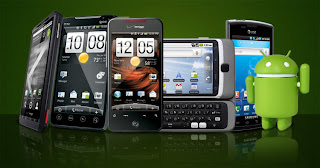In the ongoing battle
between mobile operating system giants like Google’s Android and Research in
Motion’s (RIM) BlackBerry OS 7, it seems that would-be smartphone owners will
find it hard to choose the best mobile OS for their everyday lives.
Many people are still
considering whether to go with an Android-powered phone or a BlackBerry
device. Thus, in this article, we
provide a guide about the pros and cons of each platform to assist buyers in
making informed choices.
Android
From the looks of it
Android seems to be the new kid from on the block. Introduced by Google way
back in 2007, Android has grown tremendously in just a short time. Here is a shortlist of why Android is so
great, and not-so-great.
Android Pros
- Open Source. What makes Android shine out from the rest of the crowd is its being open source. This attracts many programmers and developers from all walks of life, as Google freely distributes its source code for the Linux kernel and other publicly licensed code for anyone who wants to contribute to the development of the software. In short, programmers and developers alike can easily whip out their own versions of Android custom-tailored whatever pleases them.
- Applications. There’s an app for almost every situation, and since its inception, Android primarily focuses on enhancing user experience with the use of applications. With hundreds of thousands of apps in the Android Market, users will be overwhelmed by truckloads of apps that easily integrate with the Android OS to cater to their needs.
- Hardware. In terms of hardware, Android by far has the most numerous choices of smartphones to date. Mobile phone manufacturers like Sony Ericsson, Samsung, HTC, and Motorola offer customers a wide variety of smartphone choices to choose from. Android is flexible enough to run on almost all smartphones as long as it matches the minimum requirements.
- Software. When it comes to software, Android can run multiple apps at the same time as it has swap-space management–a luxury that not all mobile devices support due to hardware limitations. It also has ActiveSync built in natively, which allows you to easily synchronize contacts, mails, and personal information once the device is paired to a desktop computer. BlackBerry on the other hand requires some installation of software and a server.
Android Cons
- Poor Battery Life. Most Android devices experience poor battery life and this is one of the major issues that Google and Android handset manufacturers are still addressing. A typical Android smartphone dies down within a day of normal use compared to BlackBerry’s corporate design that could handle even after a day’s heavy use.
- Crapware. The Android Market may have an extensive array of applications free to download, but many of them are crapware (i.e., useless apps) as Google doesn’t screen applications before they go online. You have to go through a lot of poorly designed apps before finding a decent one that matches your criteria.
- Hardware Limitations. Since Android virtually runs on most smartphones, there’s great chance that your phone may not live up to its potential. Some phones are limited to their hardware, Android may lag and cause the phone to freeze and restart itself to free up additional memory.
BlackBerry
The veteran BlackBerry
has seen its fair share of ups and downs in the market. Geared towards the
corporate world, BlackBerry has adapted new strategies matching close rivals
such as Google’s Android. Here is a shortlist of what makes BlackBerry a perfect
and not-so-perfect choice among corporate professionals.
BlackBerry Pros
- Push Email Technology. Proud owners of BlackBerry devices are always up to date when it comes to messaging. BlackBerry easily integrates push email technology in a breeze, allowing you to instantly receive messages as soon as they start showing up in your inbox. With BlackBerry’s push email service, you can easily receive and send messages in just a matter of seconds.
- Hardware. BlackBerry’s elegant keyboard still remains the number one choice for many of its customers. The elegant QWERTY keyboard allows faster typing and accuracy that is not normally found in many of its competitors. BlackBerry also is known for being rugged yet sexy, making it durable and resistant to many forms “abuse.”
- Data Management. The lifeblood that makes BlackBerry phones a stable choice for many corporate officials would be its handling of data compression. BlackBerry phones are capable enough for compressing data down to half the size, saving you the cost of expensive bandwidth.
- Battery Life. Amongst other competitors, BlackBerry seemingly has the best battery management providing users optimal power consumption in just a single full charge.
BlackBerry Cons
- Applications. RIM has managed to follow in the footsteps of Apple by introducing their own BlackBerry App World. With much hype, the app store lacked decent amount of applications and it failed to attract developers with its poor interfaced leading to its demise.
- Slow Web Browser. Unlike its competitor, BlackBerry has the most sluggish response time when it comes to browsing the Internet. Although BlackBerry features data compression, it still can’t keep pace in loading Web resources like wallpapers and pictures.
- Business-oriented. Achieving its success by bridging the gap to the corporate world, BlackBerry failed to realize how important the average user can be. BlackBerry is looked upon as a corporate tool rather than an average device for the everyday person.
Your Choice
Despite the limitations
of both mobile platforms, Android and BlackBerry are still solid and extremely
convenient operating systems. The user
experience on either platform may differ in a lot of ways, but the two pretty
much offer similar functionalities.
While Android has a wider appeal, BlackBerry mostly has its charms
towards corporate users and business professionals. Platform loyalty and personal sentiments
aside, the two operating systems do have a lot to offer to those that choose
them.
Are you on Android or
on BlackBerry? And, why?



















0 comments:
Post a Comment